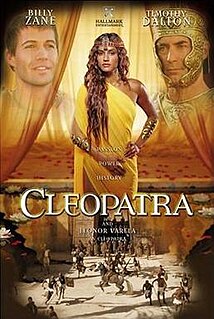Related Research Articles
"Stealing from Saturn" is the fourth episode of the first season of the television series Rome.
"The Ram has Touched the Wall" is the fifth episode of the first season of the television series Rome.
"Pharsalus" is the seventh episode of the first season of the television series Rome.
"Caesarion" is the eighth episode of the first season of the television series Rome.
"Triumph" is the tenth episode of the first season of the television series Rome.
"Kalends of February" is the twelfth episode of the first season of the television series Rome.

Atia of the Julii is a character from the HBO/BBC/RAI original television series Rome, played by Polly Walker from 2005 to 2007. The niece of Julius Caesar and mother of Octavian/Augustus and Octavia, she is depicted as a cheerfully amoral and opportunistic manipulator whose family connections and sexual liaisons have made her a highly influential figure in Roman society. Atia is loosely based on the historical figure Atia Balba Caesonia. Rome Historical Consultant Jonathan Stamp has said that the character was based on more well-known Roman women of the period, like Clodia.

The Cleopatras is a 1983 BBC Television eight-part historical drama serial. Written by Philip Mackie, it is set in Ancient Egypt during the latter part of the Ptolemaic Dynasty with an emphasis on the Cleopatras. Intended to be the I, Claudius of the 1980s, The Cleopatras met with a decidedly mixed critical reaction. It was regarded and portrayed as a gaudy farce.

Cleopatra is a 1999 miniseries adaptation of Margaret George's 1997 historical fiction novel The Memoirs of Cleopatra. Produced by Hallmark Entertainment, it stars Leonor Varela as the Egyptian queen Cleopatra, Timothy Dalton as Julius Caesar, Billy Zane as Mark Antony, Rupert Graves as Octavius, Sean Pertwee as Brutus and Bruce Payne as Cassius. Cleopatra was shown first on the ABC television network in two parts on two consecutive evenings in May 1999 and then released on videotape and DVD. Judy Farr, Martin Hitchcock and Frank Walsh were nominated for an Emmy in 1999 for outstanding art direction for a miniseries or a movie for their work on Cleopatra.
"Passover" is the first episode of the second season of the television series Rome and is an Emmy Award winner in the category Outstanding Cinematography for a Single Camera Series photographed by Alik Sakharov, A.S.C.
"Son of Hades" is the second episode of the second season of the television series Rome.
"These Being the Words of Marcus Tullius Cicero" is the third episode of the second season of the television series Rome.
"Testudo et Lepus " is the fourth episode of the second season of the television series Rome.
"Heroes of the Republic" is the fifth episode of the second season of the television series Rome.
"Philippi" is the sixth episode of the second season of the television series Rome. The episode portrays the civil war between the Second Triumvirate and the combined forces of Marcus Junius Brutus and Gaius Cassius Longinus, murderers of Julius Caesar. The Battle of Philippi is featured in this episode.
"Death Mask" is the seventh episode of the second season of the television series Rome. It aired on March 4, 2007.
"A Necessary Fiction" is the eighth episode of the second season of the television series Rome. The air date is March 11, 2007.
"De Patre Vostro " is the series finale of the television series Rome. It is the tenth episode of the second season and 22nd overall. It originally aired on March 25, 2007.

The Shards of Heaven is a 2015 historical fantasy debut novel by Michael Livingston. It chronicles Octavian's war against Mark Antony and Cleopatra, seen from the perspective of the minor historical figures who surround them.
References
- ↑ "25 Sexiest TV Shows on DVD". EW. Entertainment Weekly and Time, Inc. 2008-11-11. Retrieved 2008-11-19.